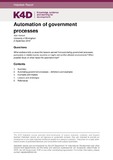Automation of Government Processes
Abstract
This rapid literature review examines the impact of, and lessons from, automating government processes in middle-income countries (MICs) and fragile and conflict affected environments (FCAEs). Automating government processes involves data collection and digitisation via information and communication technologies (ICTs), artificial intelligence (AI), and sometimes also machine learning (ML) (Paul, Jolley & Anthony, 2018, p.6). Some common examples of ML in international development include: strengthening early warning systems; situational awareness; supplementing development data; point-of-service diagnostics; market segmentation; and customer and citizen service interfaces (Paul, et al., 2018). Automation can improve the efficiency, quality and coverage of service delivery – e.g. automation of a medicine inventory management system in Pakistan led to control over theft, more transparency, better monitoring and evaluation, and more efficient service delivery in a pilot initiative (DFID, 2018). Automation of aspects of public sector staff recruitment, performance review, management, and monitoring can address nepotistic practices, can lead to efficiency savings on the salary bill, can improve staff and institutional performance, and can increase transparency and trust in institutions, among other impacts. Present ML and AI systems are unable to recognise if the decision made agrees with the context, like human analysis can, and thus ML can lead to suboptimal decisions (Paul, et. al., 2018). So while ML and AI systems can be statistically very good, they can fail for individual cases. This raises important dilemmas in regards to accountability.
Citation
Herbert, S. (2019). Automation of government processes. K4D Helpdesk Report. Brighton, UK: Institute of Development Studies.Is part of series
K4D Helpdesk Report;661Rights holder
© DFID - Crown copyright 2019Collections
- K4D [937]

